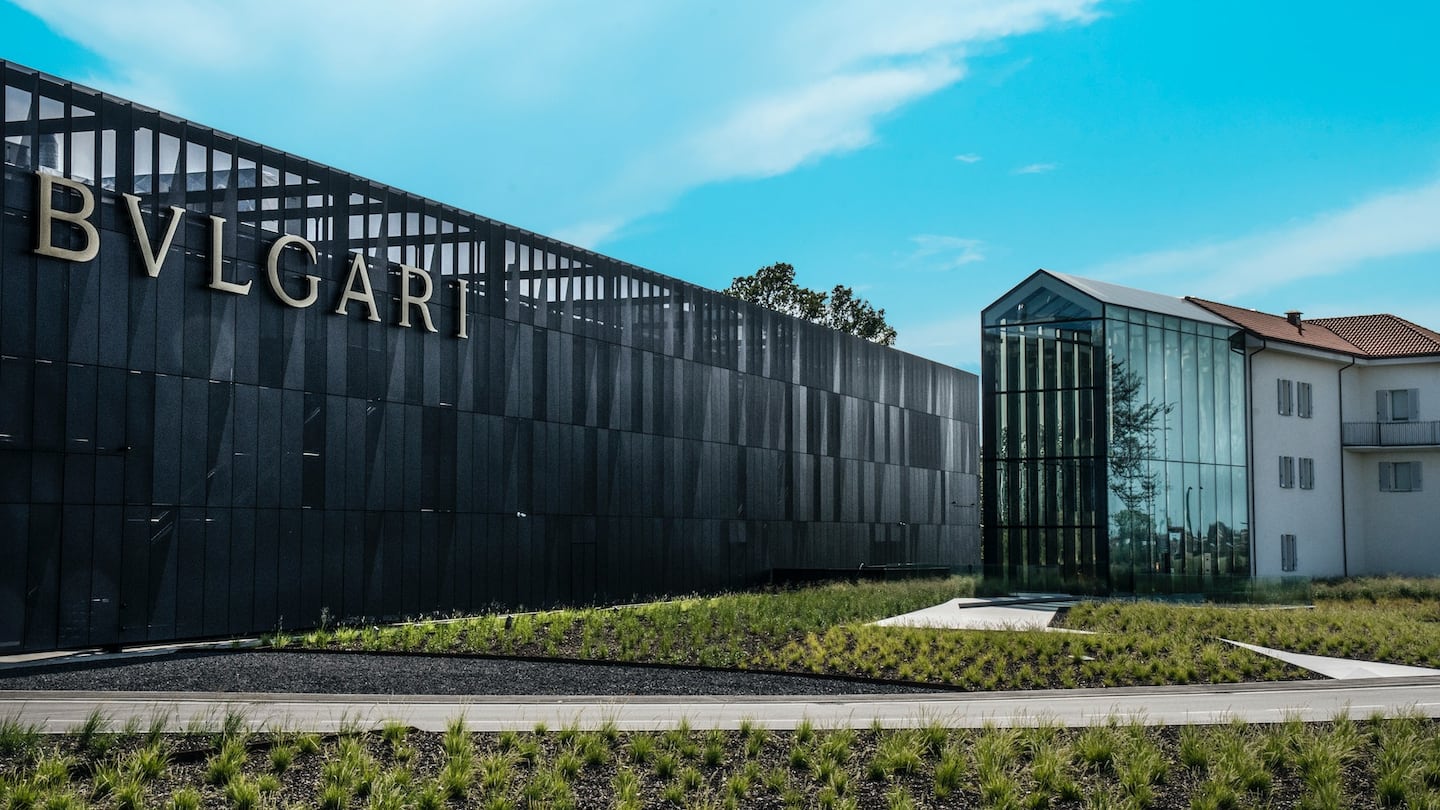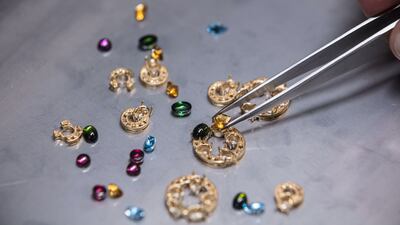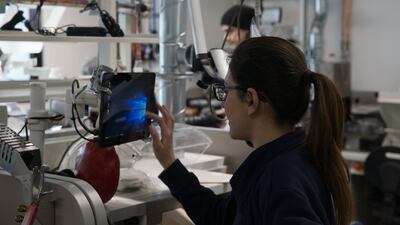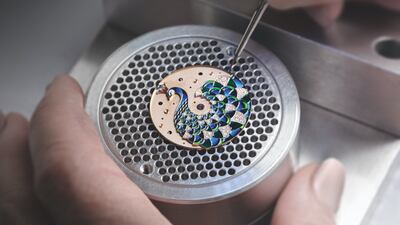
The Business of Fashion
Agenda-setting intelligence, analysis and advice for the global fashion community.

Agenda-setting intelligence, analysis and advice for the global fashion community.

Disclaimer: At the time of publication, the Bulgari Manifattura in Valenza and the Chiming atelier in Le Sentier have been closed for two weeks as a precautionary measure in light of the coronavirus pandemic.
VALENZA, Italy — Since its founding in Rome in 1886, the artisanal maison Bulgari has produced its high jewellery products in the Italian capital. Following its acquisition by LVMH in 2011, Bulgari has expanded its product offering to include watches, bags, accessories and perfumes, with production facilities in Florence, Lodi and Como, with only its watches made outside Italy, in Switzerland. It is one of six brands that make up LVMH's jewellery and watch segment, which combined brought in €4.4 billion of sales in 2019.
In 2017, the 136-year-old brand opened a new manufacturing facility in Valenza. Eighteen workshops, known internally as “islands,” make up the Manifattura Bulgari and are grouped by fine and medium high jewellery products, integrating production, planning and logistics with jewellery makers, stone-setters and polishers. Northwest of Valenza, across the Italian-Swiss border, the chiming atelier sits in Le Sentier — a village in the Swiss mountains, famed for its watch-making history and culture.
Nurturing career development opportunities from within and teaching students the brand’s characteristic techniques and production methods, the Chiming atelier has a small academy to train a handful of watchmakers and foster their passion for the craft, while the 14,000-square-meter Manifattura holds the Bulgari Jewellery Academy, where hundreds of young artisans acquire training from professional goldsmiths and jewellers. By 2022, the brand intends to build an extension onto the Manifattura, which would take the space from the largest jewellery manufacturing space in Europe to the largest in the world.
BoF sits down with three of Bulgari’s artisanal workers to hear about how the business fosters creative talents’ career paths, infuses learning in the day-to-day, and empowers its artisans to combine innovation with the brand’s inherent Roman aesthetic.
Elaine Estella Pacia, Gold Cleaner
Despite having no prior industry experience, Pacia was accepted into the Bulgari Academy and trained as a gold cleaner. She has worked in the Valenza Manifattura for 2 years.
What is exciting about working at Bulgari today?
Bulgari always involves young people within its decision-making, which helps us greater discover and enhance talent. Our department consists of a lot of young people working alongside experts with about 20 years’ experience, which means we learn first-hand within our team — but they also want to hear our new ideas too, so we can share learnings. They really listen to my ideas.

Stone setting in the Bulgari Factory by David Atlan | Source: Courtesy
What was your experience at the Bulgari Academy?
Before I started working at Bulgari, I was working in restaurants and I didn’t have any experience in jewellery making. But Bulgari offers a lot of opportunities for younger people through the Bulgari Academy, and it all started there.
Being at the Bulgari Academy was an eye-opening experience for me as my professors really helped me discover where my talents lie. One of my professors was an expert in jewellery polishing, having been at Bulgari for more than 20 years. She had a lot of patience, offering a lot of one-on-one training. She clearly really wanted to share her expertise with the younger students, which made her easy to approach. Whenever I have questions, she’s always there to give me some ideas.
How does Bulgari empower you to explore your creativity?
The Academy introduced me to the beauty of jewellery making, giving me a chance to grow by having the opportunity to work with experts in the factory. Growing and learning inside Bulgari never ends and there's always something new to discover. I’m constantly discovering new methods on how to improve the quality of the products.
My workplace is also well-equipped with modern and precise instruments, not only to enhance my creativity but to work in a space that guarantees the safety of its workers. We are equipped with the right safety gear and they regularly check the department to make sure that everything is safe to use.
How would you describe your team dynamic?
In our island, which is what we call the different teams, our boss ensures a calm working environment because a stress-free atmosphere helps us grow, support and help each other, allowing us to fulfil our potential and achieve the finest results.
We work through trial and error, because through making mistakes, we can improve on every aspect of the work we do.
Our island is also open-minded, open to constructive criticism and willing to admit if we’ve made some mistakes. We work through trial and error, so we do a lot of experiments. I think this is important because through making mistakes, we can improve on every aspect of the work we do.
Our team also collaborates with the whole company to do its part to deliver on quality and help others, even if they're not a part of our team. For example, before launching a new product, which we call “the pre-series,” we go to the other departments to gather their expertise and ideas on how to finish the product to the highest standard.
Simone Rossetti, Stone Setter
Having worked at Bulgari since 2013, Rossetti moved with the brand from the old manufacturing plant to the new space in Valenza in 2017.
How would you describe your team dynamic?
Everyone working in the jewellery sector — goldsmiths, polishers and stone setters — work in close proximity to each other, allowing for a quick and easy dialogue, so if there’s a problem, we know about it sooner and can evaluate the severity of the problem. We can then often foresee wider problems before they emerge and find a solution.

Bulgari Factory in Valenza by David Atlan | Source: Courtesy
There’s also a good integration between the younger people and the senior workers, especially because of the academy-type environment. If you’re ever unsure of something, there’s always an expert you can go to. We learn from one another and continue to foster that to build up trust, so every team member can feel free to ask anything and share any doubts or difficulties they’re experiencing.
How does Bulgari foster career development?
Bulgari really supports me in my role and there’s always more to learn every day at the workbench. However, there are also a wide range of courses, ranging from soft skills to hard skills needed for this job, from IT training to more technical courses, such as ones on gemmology, diamonds or corporate social responsibility.
We also have an internal mobility policy, which offers different job opportunities to staff members according to their skillsets, so when various positions become available, even in other departments or branches, you can ask to be transferred. This is a great system as it gives us the opportunity to expand our work spectrum.
How does the Bulgari brand empower you to explore your creativity?
At Bulgari, we’re given free rein in our work. As a stone setter, I can raise new developments with my colleagues, allowing us to constantly improve product lines, systems or production phases. If I discover a faster method to make something, which will result in a higher quality of the final product, I’m free to implement it and then it’s my responsibility to share it with others.
We also work with different departments and teams to develop new processes and methods. For example, when we are in the initial phases of making a product, we go to the industrialisation department for advice, as they will provide guidance on first steps.
We're given free rein in our work, allowing us to constantly improve product lines, systems or production phases.
We ask each other for advice and share tips or skills we might need. Recently, we made the “dragon necklace,” a high-quality piece which required a technical means of combining three colours of metal and gold. We successfully carried out this technique without compromising the quality of gold, which we then shared with other departments.
What has your experience been in the Valenza Manifattura?
The set-up is really top of the range. The old factory was still fairly innovative, but a big difference is more space for socialising in break areas and a huge canteen. It was certainly a big change and the relocation was a bit difficult to manage, but the company was great. They set up carpooling and shuttle buses to help, staggering work hours to adapt to the needs of workers, especially if they have families.
When the team was preparing to move to the new manufacturing plant, all the goldsmiths were asked for their input on how to create their workbenches. We were consulted on the ergonomics of the workstations to ensure we had the best apparatus. I asked for top-of-the-range microscopes as we work with them a lot in our role as stone setters.
Pascal Legendre, Watch Maker
Working in the Chiming atelier in Switzerland’s famed watch-making village Le Sentier, Legendre has worked at the brand for 15 years.
How does Bulgari empower you to explore your creativity?
I’ve worked in the Bulgari atelier for 15 years and in chiming watches for almost 30 years, and what has always been fundamental at Bulgari is the obsession for craftmanship and quality, so my passion for the job has never left over these years. Bulgari helps me explore my passion by allowing me to constantly try out new projects. We work on new products almost every day, so we’re trying to take grande sonnerie watches one step further all the time.

Inside Bulgari's Chiming atelier | Source: Courtesy
Bulgari gives me a great deal of freedom to work, which is really motivating. It gives us the space to research new materials so we can develop the ring of the watch, make it louder and improve its performance.
What is your experience in the Chiming atelier?
We work in a workshop in a small building, filled with very competent people. We work in close proximity while creating products, combining the mechanical movement with construction, together with the designers in the technical office, which enables us to work more efficiently. We still work manually on old machines, so we use very few digital tools, but we've reworked every aspect of the machinery, so it is more effective.
It is an old, wooden workshop with large windows facing out onto the mountains, which provides complete peace and quiet. This atmosphere also helps when we are testing out new materials, because it is about the reputation of the sound, which depends on the performance of different materials, like what kind of steel or glass you use.
How would you describe your team dynamic?
Chiming watches is really the summit of expertise in watchmaking, so we do not produce thousands of pieces a year. As a result, our atelier is made up of just four people. As individuals, we all have our own strengths and weaknesses, so it's about listening to each other’s experience and passion — and then listening to the different departments across the brand.
We all have our own strengths and weaknesses, so it's about listening to each other's experience and passion.
Sharing is very important. For example, when we work on a product like the “Octo Finissimo,” which means the flattest minute, which is really the pinnacle of watchmaking, it took us six years to create it as a team. So, we have to listen to each other to allow for effective collaboration among our team, the designer and across the whole company.
How does Bulgari foster career development?
The best aspect of Bulgari is fostering the know-how, the craftsmanship and expertise — it’s very important to the brand. We don’t take watchmakers from other companies but instead have a small academy here, so when younger people arrive to work at the atelier, we can train them in-house. Through training them personally, we can learn a lot from them, but it also means we can check they are not only skilled but also passionate.
In watchmaking, there are five levels of complication. You start with the simple movement and then you go to the chronograph watches. Then, if you are really good watchmaker, you can go to the tourbillon. It is at this stage that we discern who is more passionate and therefore better suited to the job. Then, the next step is perpetual calendar watches and the chiming watches.
You can be a good watchmaker but if you don’t have the passion, you cannot go to chiming as we do not believe you are ready to make watches well. Striking watches are really a piece of art, which is why passion is so important. Now, in the tourbillon, we have several talents that we know will be the next chiming watchmakers, so we are just waiting for them to be ready to join.
This is a sponsored feature paid for by Bulgari as part of a BoF Careers partnership. To explore careers at Bulgari, please click here.
Related Articles:
[ At Bulgari, Infusing Global Innovation with Local HeritageOpens in new window ]
[ At Bulgari, Unifying the Client Experience Through Digital ConnectivityOpens in new window ]
Discover the most exciting career opportunities now available on BoF Careers — including jobs from Hugo Boss, Banana Republic and House of CB.
To provide actionable insights and inspiration on how fashion and retail industries can further embed diversity, equity and inclusion in the workplace and business strategies today, BoF Careers co-hosted a panel discussion with The Outsiders Perspective. Now, BoF shares key learnings from the panel.
A US regulator has banned most uses of the clauses, which started as a way for fashion companies to prevent senior executives from walking off with trade secrets, but have become a standard retention tool.
Check out this week’s new partners and openings on BoF Careers, the global marketplace for fashion talent.